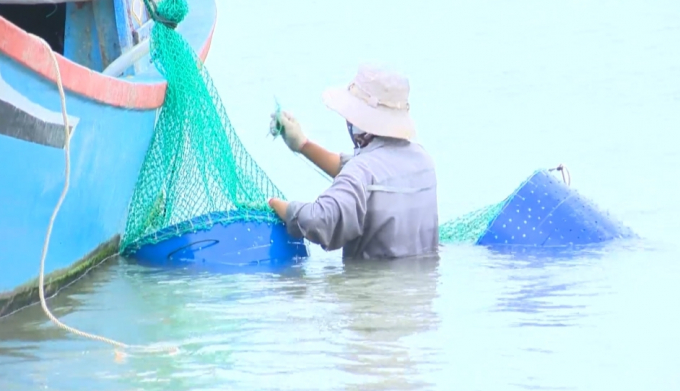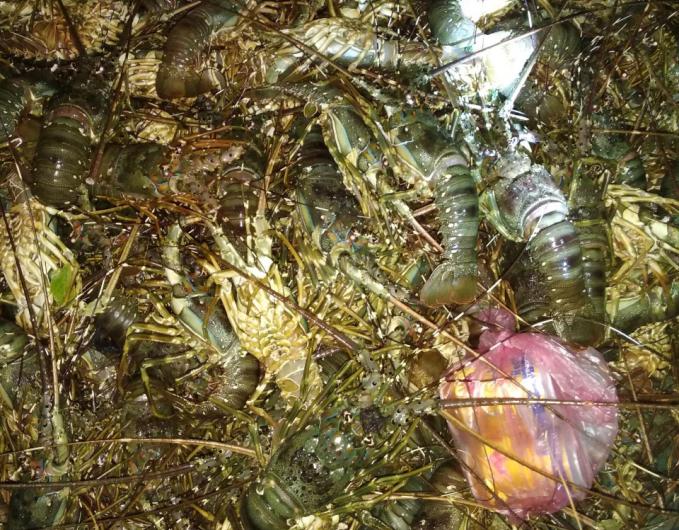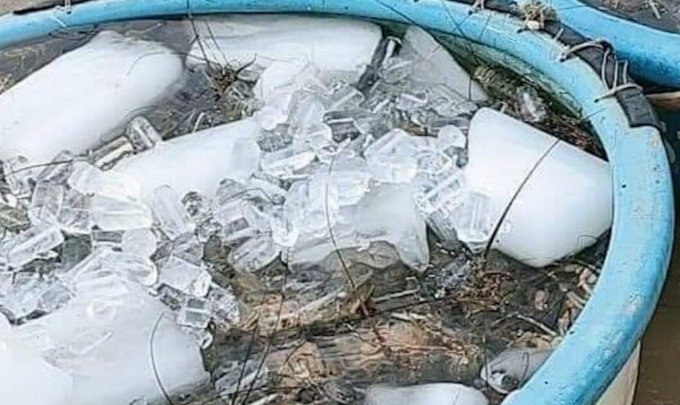November 21, 2025 | 21:17 GMT +7
November 21, 2025 | 21:17 GMT +7
Hotline: 0913.378.918
November 21, 2025 | 21:17 GMT +7
Hotline: 0913.378.918

Farmers in Xuan Yen ward, Song Cau town, pick up dead lobsters. Photo: NL.
On August 11, the Animal Husbandry and Veterinary Sub-Department of Phu Yen province received information that lobsters and marine fish were raised in cages in Phuoc Ly quarter, Xuan farming area Yen ward, Song Cau town had died suddenly.
The Sub-department has directed the Animal Husbandry and Veterinary Station of Song Cau Town to check the actual location situation.
Mr. Nguyen Van Lam, Director of Phu Yen Provincial Sub-Department of Livestock and Veterinary Medicine, said that lobsters and marine fish were raised in Dam Dan area, in the farming area of Phuoc Ly neighborhood, Xuan Yen ward, had died on August 10.
Accordingly, 200 cages with about 29,240 lobsters and 185 cages with 1,220 fish of all kinds (mainly grouper and seabass) died with different sizes.
Immediately after farmers discovered dead lobster and fish, Phu Yen Animal Husbandry and Veterinary Sub-Department took measures to raise the cage to the upper water layer. Therefore, there is no longer an abnormal death of shrimp and fish.
Regarding the cause of death of lobster and fish, according to Mr. Nguyen Van Lam, the specialized agency did not detect any signs of disease through physical examination. Shrimp and fish deaths occur in a short period, suddenly.

Lobsters in Xuan Yen ward died due to a lack of oxygen. Photo: TTh.
In the past few days, the impact of storm No. 2 has disturbed the bottom layer, plus organic sediments accumulated for a long time due to waste from farming activities, so toxic gases in the bottom layer are released, and poisonous algae develop. Thereby causing shrimp and fish to die suddenly due to lack of oxygen and asphyxiation of toxic gases.
Faced with the above situation, to limit the risks caused by environmental incidents in the farming area, the Phu Yen Department of Livestock and Veterinary Medicine recommends that farmers not raise shrimp and fish with high density. Farmers should thin the stocking density to avoid local hypoxia in cages, not increase the number of cages.
Along with that, cleaning cages to enhance water exchange, regularly observing the water environment in the farming area, and checking the health of farmed aquatic products, especially at night, to detect problems promptly.
Farmers need to take measures to get close to the water surface if the environment changes abnormally or the aquaculture occurs asphyxiation. Simultaneously apply criteria to create oxygen (aeration, oxygen pellets) to increase dissolved oxygen content in water for aquatic animals to breathe.
In addition, to increase the resistance of shrimp, farmers need to add vitamins, Bio-EM probiotics, minerals, etc., to the feed to limit diseases arising, do not use spoiled, rotten food for aquatic animals to eat and strictly manage feeding to avoid excess. If seafood has reached commercial size, farmers need to harvest it to reduce damage when environmental problems occur.

Lobsters died not from the disease. Photo: NL.
According to the People's Committee of Xuan Yen ward, 18 farming households in Phuoc Ly neighborhood lost 29,240 lobsters, equivalent to more than VND 2.4 billion, and 1,220 marine fish, estimated at VND 45 million.
Previously, in October 2021, fishermen in this neighborhood were also severely damaged because freshwater shrimp died in mass.
It is known that Phu Yen province is the largest lobster farming area in the country. In particular, in Song Cau town in 2021, there are 4,852 lobster farming households with 58,695 cages with an output of 1,050 tonnes (the annual average production is 1,000 tonnes with a value of from VND 660 to VND 995 billion per year).
According to the Vietnam Association of Seafood Exporters and Producers (VASEP), in the first half of 2022, shrimp exports reached US$ 2.3 billion, up 33% over the same period and accounting for 40% of total seafood exports.
Lobster exports recorded a record growth, reaching nearly US$ 130 million in the first half of this year, up 30 times over the same period last year. Particularly, lobster exports to China in the first 5 months of 2022 recorded a breakthrough with an increase of nearly 29 times over the same period last year, reaching over US$ 108 million.
Previously, in 2020, Vietnamese lobsters could not be exported because of the epidemic, so some places had to sell them in the form of "rescue" at unprecedented low prices. In 2021, lobster exports continue to decline, only to recover in 2022.
Translated by Ha Phuc

(VAN) This assistance supports people who temporarily relocate or evacuate, as well as communities affected by major storms from late September to now.

(VAN) Viet Nam will host the 8th ASEAN Heritage Parks Conference, bringing together over 320 delegates and reaffirming its role in regional nature conservation.

(VAN) According to MAE, heavy rains and flooding from November 16-19 caused major losses in lives, homes, and agricultural production across the central provinces.

(VAN) Amid vast floodwaters, the spirit of sharing and helping others shown by many people in Gia Lai reached tens of thousands of residents stranded by raging floods.

(VAN) Climate change is set to emerge as a key focus of collaboration within the framework of the Comprehensive Strategic Partnership between Viet Nam and New Zealand.

(VAN) Future veterinarians will be the ones directly deciding how antibiotics are prescribed, administered, guided and managed across thousands of farms nationwide.

(VAN) Argentine Ambassador Marcos Antonio Bednarski says Viet Nam is playing an increasingly influential role in Argentina’s economic and technical engagement in Southeast Asia, as Buenos Aires is seeking long-term partners.